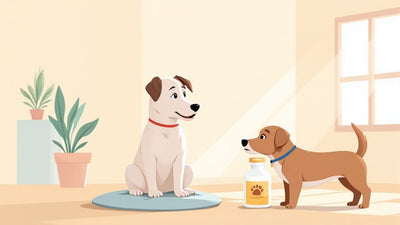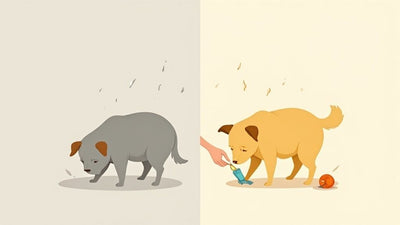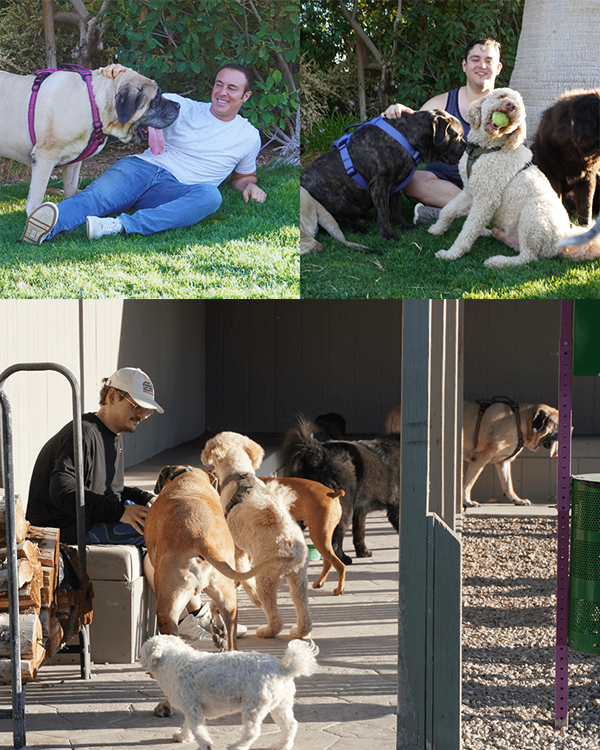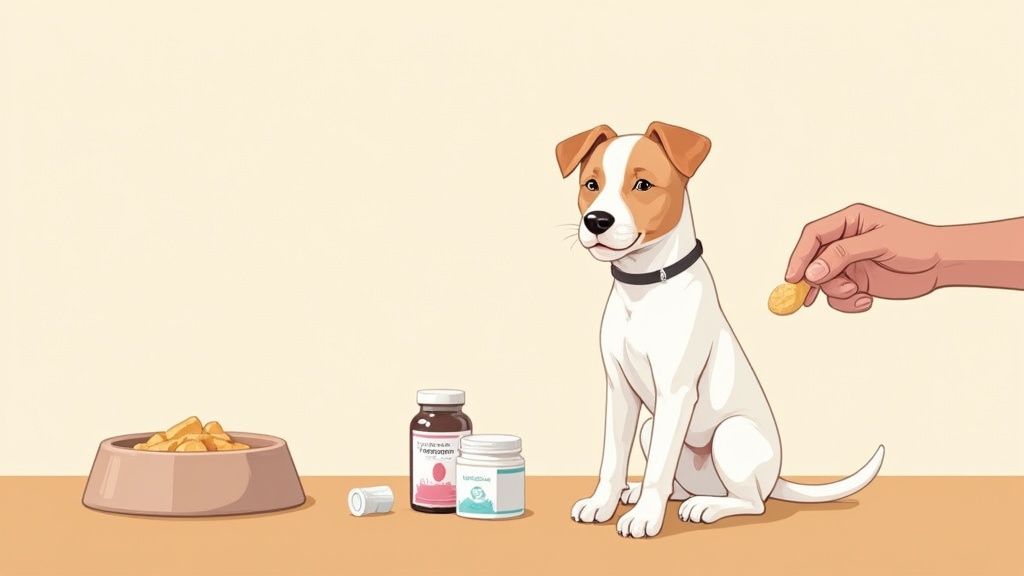
A Guide to Canine Anxiety Meds
When a dog's fear becomes persistent and overwhelming, medication can be a supportive tool. We understand that this isn't about finding "happy pills." It's about using sophisticated support to help rebalance a dog's brain chemistry, creating a path back to a calmer state of mind. When behavioral training and environmental changes aren't enough, your veterinarian might bring medications like Fluoxetine or Alprazolam into the conversation.
Your Anxious Dog Is Asking for Help

It’s a heartbreaking feeling, isn't it? Watching your best friend tremble during a thunderstorm or seeing them pace frantically by the door. Those 3 AM searches about dog anxiety and the constant knot of worry in your stomach are all too real when you know the source of your greatest joy is struggling.
If this sounds familiar, please know you’re not alone. Seeing your dog in such distress is tough, and feeling overwhelmed is a completely natural response. It's important to remember that their anxiety is not a training issue. It's a real condition, just like arthritis. Your dog isn't being "bad"—they're communicating their struggle in the only way they know how.
Recognizing the Need for Support
The signs of anxiety can start small—a little whimper here, some restlessness there—but they often grow more obvious over time. Learning to spot these specific behaviors is the first step toward getting your dog the comfort they deserve.
Common signs of anxiety include:
- Destructive behavior, especially chewing on door frames or window sills when left alone.
- Excessive barking or whining that seems to come from a place of distress.
- Pacing or restlessness, an inability to just relax and settle down.
- Hiding or clinging to you for reassurance, even in familiar places.
- House soiling (urinating or defecating inside) even though they are fully potty trained.
These aren't just random quirks. They're outward expressions of an internal struggle—a sign that your dog's nervous system is stuck on high alert.
A Path Forward Together
We created this guide for devoted dog parents just like you. We believe that understanding the "why" and "how" behind anxiety treatments can bring immense comfort and empower you to make confident decisions for your companion. While medication is a powerful and often essential tool, it’s just one part of a comprehensive care plan.
Our goal is simple: to help you find more good days together. Medication, when used correctly, doesn't change your dog's personality; it quiets the noise of their fear so their true, happy self can emerge again.
We'll walk through the available options, explaining how they work and what to expect in a way that makes sense. This journey is about building a thoughtful, supportive strategy alongside your veterinarian. You can also explore how to support your dog’s mental wellbeing with a holistic view. Together, we can help restore calm, clarity, and countless joyful moments to your dog’s life.
Get Your FREE Dog Brain Health Guide

Get instant FREE access to today's top ways to help your best friend live a longer, healthier, happier life.
- 39 value-packed pages of expert insights
- Early-detection tips for cognitive decline
- Top brain-boosting superfoods
- Vet-approved mental sharpness strategies
- Fun IQ tests for your dog
When to Talk to Your Vet About Medication
We all know the common, everyday fears. Maybe your dog dives under the bed when the vacuum starts, or perhaps they give a wide berth to strangers on your daily walk. These fleeting moments of caution are a normal, healthy part of being a dog. But when does a simple fear cross the line into persistent anxiety that steals their joy?
You're not imagining it when you see that worried look in their eyes day after day. The shift from a momentary scare to a constant state of unease is a critical signal. It’s the sign that your dog needs more support than you can provide alone, and it’s the perfect time to start a conversation with your veterinarian.
Recognizing When It's More Than Just a Bad Day
The signs of ongoing anxiety often build so slowly that they become a new, unfortunate "normal." It's incredibly important to see these behaviors for what they are: not character flaws, but calls for help. Your dog isn't being naughty; they're feeling overwhelmed.
Consider reaching out to your vet if you notice patterns like these:
- Destructive behavior when you're gone. Think chewed-up door frames, shredded couch cushions, or deep scratches on window sills. This isn't boredom; it's often a sign of separation anxiety.
- Inappropriate urination or defecation. A perfectly house-trained dog who suddenly starts having accidents inside isn't being defiant. They're likely too distressed to control themselves.
- Constant restlessness. Pacing, whining, or an inability to just settle down for more than a few minutes can mean their nervous system is working overtime.
- Fear-based reactions. This can range from hiding and trembling to more alarming behaviors like growling or lunging at triggers they can't escape.
When you see these things, it means your dog's quality of life is being impacted. Their world has become a scary place, and they’re caught in a cycle of fear they can't break on their own.
Medication Is Not a Last Resort
For many loving parents, the idea of canine anxiety meds can feel like a final, drastic step—maybe even a sign of failure. We understand that feeling. It's time we reframe that thinking entirely. Medication isn't giving up; it’s a compassionate and effective tool that provides stability and relief. Often, it’s the very thing that helps your dog heal.
Think of it this way: when a dog is overwhelmed by anxiety, their brain is too flooded with stress signals to learn anything new. Medication helps lower that "volume," creating the calmer mental space they need to finally absorb positive training and learn better coping skills.
This decision is always a partnership between you and your vet. They have the expertise to help you weigh the benefits and create a plan that fits your dog’s specific needs. The goal is never to change your dog's personality. It's about lifting the heavy weight of fear so their true, happy self can shine through again.
How Different Anxiety Medications Support Your Dog
Trying to understand the world of canine anxiety medication can feel overwhelming. The names are complicated, and it's easy to get lost in the science. Our goal here isn't to turn you into a veterinary pharmacist, but to give you enough clarity to have a really productive conversation with your vet.
Let's think of these medications less as complex chemicals and more as different kinds of helpers, each with a very specific job to do.
More and more pet parents are recognizing that a dog's mental health is just as important as their physical well-being. This shift is reflected in the market for dog relaxants, which was valued at USD 186.2 million in 2024 and is on track to more than double by 2035. This growth is driven by a better understanding of how to support common issues like separation anxiety and noise phobias with medications like SSRIs and benzodiazepines. You can see more on this trend over at metatechinsights.com.
To make this easier to digest, here’s a quick overview of the main types of medications your vet might discuss.
A Quick Look at Common Canine Anxiety Medications
This table breaks down the key medication classes, what they do in simple terms, and when they are typically used.
| Medication Class | How It Helps in Simple Terms | Best For | Example Drug Names |
|---|---|---|---|
| SSRIs | Helps the brain better use its own "feel-good" chemical (serotonin) over time. | Daily support for ongoing, generalized anxiety or separation issues. | Fluoxetine (Prozac®), Sertraline (Zoloft®) |
| TCAs | Helps balance multiple brain chemicals to regulate mood. | Separation anxiety, compulsive behaviors, and generalized anxiety. | Clomipramine (Clomicalm®) |
| Benzodiazepines | Acts quickly to calm the central nervous system during a panic event. | Situational, predictable stress like thunderstorms, fireworks, or vet visits. | Alprazolam (Xanax®), Diazepam (Valium®) |
Now that you have the big picture, let's explore how these different "helpers" actually work for your dog.
The Long-Term Supporters: SSRIs and TCAs
Some medications are designed to work quietly in the background, building a more stable emotional foundation for your dog over weeks and months. Think of these as the daily maintenance crew for your dog's brain.
-
Selective Serotonin Reuptake Inhibitors (SSRIs): This is one of the most common starting points for vets. An SSRI like Fluoxetine doesn't add anything artificial to your dog's system. Instead, it helps the brain make better use of its own serotonin—a natural chemical that creates feelings of well-being. It’s all about helping the brain’s own mood-regulating system work more efficiently, which is why it’s often chosen for generalized anxiety or separation issues.
-
Tricyclic Antidepressants (TCAs): A bit like SSRIs, TCAs such as Clomipramine also work on brain chemistry to help even out mood and dial down anxiety. They tend to affect a broader range of chemical messengers, which can be highly effective for specific issues like severe separation distress. With both SSRIs and TCAs, patience is key. It often takes a good 4-6 weeks for them to build up in the system and show their full effect.
So, when is it time to have that talk with the vet? This simple chart can help you decide.
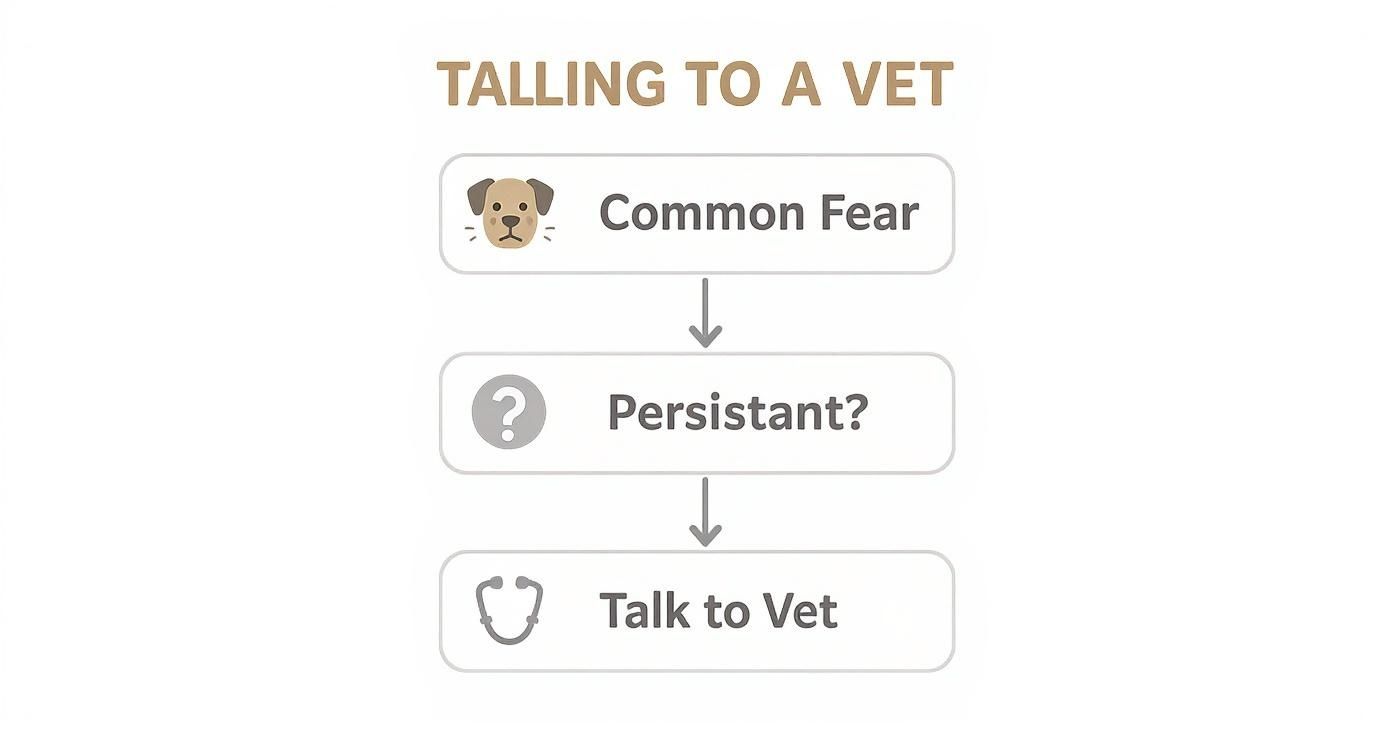
As you can see, when a typical fear stops being a once-in-a-while thing and becomes a persistent problem, that's your cue to bring in a professional.
The Short-Term Helpers for Predictable Stress
Other medications are more like a rapid-response team, brought in for specific, predictable events. These are the tools you use when you know a storm is brewing or the Fourth of July fireworks are coming.
The whole point of these "situational" medications is to provide temporary comfort. They help your dog get through a known trigger without the full-blown panic, which can prevent a single scary experience from becoming a deep-seated phobia.
Benzodiazepines (BZs): Drugs like Alprazolam are a perfect example. They work fast to calm the physical and emotional signs of intense fear. Your vet might prescribe one to give your dog an hour or so before fireworks start or a thunderstorm hits. Because they act quickly and wear off just as fast, they're not meant for managing day-to-day ongoing anxiety.
Finding the Right Support for Your Dog's Journey
Every dog is an individual, and their path through anxiety is just as unique. That's why your veterinarian is your most critical partner in this process. They will look at your dog’s specific symptoms, their overall health, and your family’s lifestyle to map out the best path forward.
While prescription medications are incredibly powerful tools, they are almost always part of a bigger plan. Gentle, targeted nutritional support can also be a fantastic way to maintain your dog's cognitive health and promote a natural sense of calm.
For dogs whose anxiety might be tied to age-related cognitive changes, a supplement that supports brain clarity can make a world of difference. Our dual-action NeuroChew formula was designed precisely for this, serving as a wonderful complement to their overall wellness plan. The journey to a calmer, happier dog is a partnership, and exploring every avenue of support shows just how dedicated you are.
Navigating the First Few Weeks on Medication
Starting your dog on a new anxiety medication is a journey you take together—you, your dog, and your veterinarian. We know it can bring up a mix of hope and apprehension. You’ve taken a big step, and it’s completely normal to be watching your dog closely, looking for any sign of change.
Think of these first few weeks as a critical adjustment period. Your patience here is just as important as the medicine itself. We all wish for an instant solution, but long-term medications like SSRIs simply don't work overnight. It’s a lot like tending to a garden; the support needs time to soak in before new, healthier behaviors can start to grow. Your job is to observe and keep things calm and predictable.
What to Expect During the Adjustment Period
When starting canine anxiety meds, it's not uncommon for some dogs to experience temporary side effects as their body gets used to the medication. These are usually mild and tend to fade within a week or two, but knowing what to look for can ease your own worries.
You might notice a few initial changes:
- Increased Sleepiness: Your dog might seem a bit more tired or lethargic. This is one of the most common reactions as their system adapts.
- Changes in Appetite: Some dogs might turn their nose up at their food for a few days. Sometimes, offering smaller, more frequent meals can help.
- Mild Stomach Upset: A little digestive wobble can happen, but it shouldn't be severe or last long.
This is exactly why that partnership with your vet is so crucial. Keeping a simple daily log of your dog’s behavior, appetite, and energy level gives your vet incredibly valuable feedback during check-ins. This isn't about looking for an overnight transformation; it's about tracking the journey together.
The Power of Patience and Observation
For long-term medications like Fluoxetine or Clomipramine, you won't see the full picture right away. The most meaningful changes often start to appear after four to six weeks. That's how long it takes for the medication to build up in their system and gently support the brain’s neurochemistry. It's a gradual shift, not a flip of a switch.
The goal during these early weeks is progress, not perfection. We're trying to turn down the volume on the "background noise" of anxiety, so your dog can feel safe enough to relax and, eventually, learn new, calmer ways to respond.
Your role as an observer is absolutely essential. You know your dog better than anyone. Instead of waiting for a dramatic personality change, learn to spot and celebrate the small wins. They are the truest signs that the medication is beginning to work.
Celebrating the Small Wins
So, what does early progress actually look like? It’s often found in the subtle, quiet moments that start creeping back into your daily life. Small improvements can mean everything, and they deserve to be celebrated as the huge victories they are.
Keep an eye out for signs like:
- Sleeping soundly through the night without pacing.
- A calmer reaction to the doorbell—maybe one bark instead of a frantic one.
- Nudging a favorite toy for the first time in weeks.
- The ability to settle and rest in a room alone, even just for a few minutes.
Each one of these moments is real progress. Remember, you and your vet are a team. By being patient, observing closely, and keeping communication open, you can navigate this initial period with confidence, knowing you’re giving your dog the best possible support to find their happy, calm self again.

Support Your Dog's Brain Health with NeuroChew™
As mentioned in this article, NeuroChew is the first dog chew designed to support both cognitive function and healthy circulation. Perfect for dogs showing early signs of cognitive decline or for proactive brain health support.
Why Behavior Training Is the Other Half of the Solution
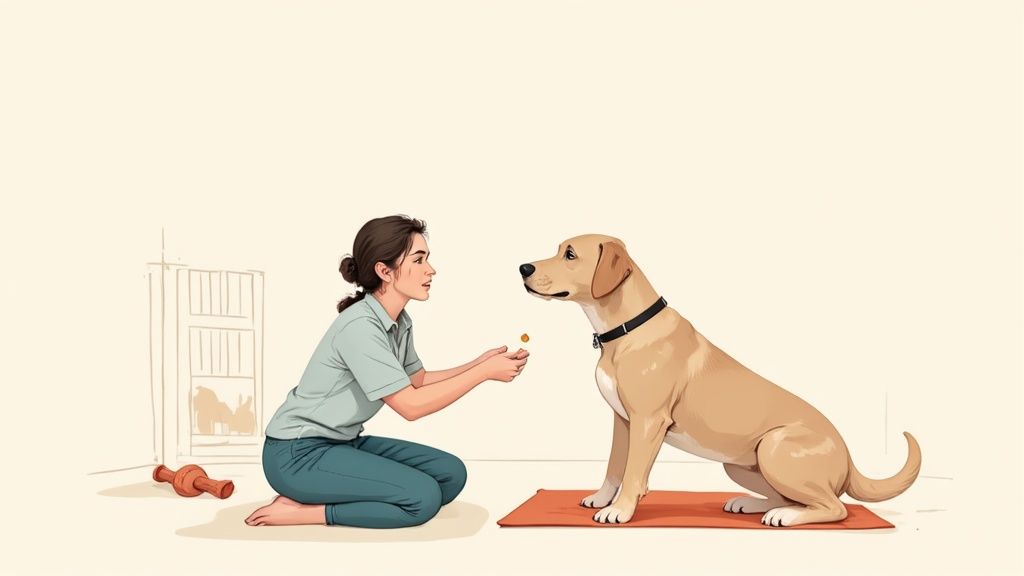
It’s easy to think of medication as the solution, but it's much more helpful to see it as the key that unlocks the door to real, lasting progress. While anxiety medications are powerful tools, their true value is in creating an opportunity—a window of calm where your gentle training and loving support can finally sink in.
Think about it: when a dog is completely overwhelmed by fear, their brain is in survival mode, which makes it nearly impossible to learn. Medication turns down the volume on that internal alarm, giving them the mental breathing room to engage with you and learn healthier ways to cope. It’s the crucial first step that makes everything else you do so much more effective.
Creating a World of Predictable Calm
Behavioral support doesn't mean you need to become a professional trainer overnight. It often starts with something much simpler: building a foundation of safety and predictability in your dog's daily life. When their world feels stable and reliable, their anxiety has less fuel.
Here are a few gentle but incredibly effective strategies:
- Establish a Consistent Routine: Dogs are creatures of habit and find immense comfort in knowing what to expect. Try to keep feeding, walks, and even quiet time at roughly the same time each day. That structure is a powerful anchor for an anxious mind.
- Create a Designated Safe Space: Every dog deserves a den—a quiet retreat where they know they will never be bothered. This can be a comfy crate (with the door open) or just a cozy bed in a quiet corner. Make it clear this space is their personal sanctuary.
- Use Positive Reinforcement: Catch them being calm. When you see your dog relaxing on their own or showing a moment of bravery, reward it with quiet praise or a high-value treat. You're teaching them that being calm is a wonderful, rewarding state to be in.
This integrated approach of medication and supportive care is becoming the gold standard. It’s a major reason why the global market for pet calming products was estimated at USD 17.2 billion in 2024. Dogs make up a huge piece of that pie, at USD 8.25 billion, as owners increasingly seek out everything from prescription meds to calming aids. You can explore the full market analysis on Grand View Research.
Gently Reshaping Fearful Responses
Once your dog feels a bit more stable, you can start to gently reshape their reactions to specific triggers. This process has a technical name—desensitization and counter-conditioning—but the concept behind it is beautifully simple.
The goal is to change your dog's emotional response from "That's scary!" to "That sound means something good is about to happen!"
Take a dog with storm phobia, for example. You might start by playing a recording of thunder at a volume so low they barely notice it. While the sound is playing, you offer them an amazing treat, like a tiny piece of chicken. Over many sessions, you gradually increase the volume, always pairing the sound with that wonderful reward.
This one-two punch of medication and training can be truly life-changing. You can also learn more about managing dog anxiety and behavior on our blog. The medication provides the neurological stability, and your training builds the new, positive associations that create real, lasting confidence.
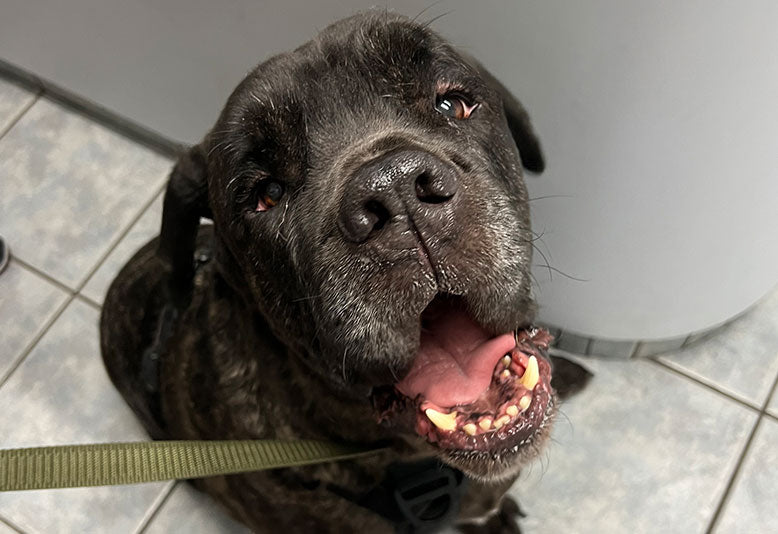
Real Results: How NeuroChew Helped Brutus Regain His Mental Clarity
Brutus was getting disoriented at night. After starting NeuroChew, he's more happy during the day and steady at night. He's back to his old self!
Exploring Gentle Supplements and Natural Support
For many of us, the first instinct isn't to reach for a prescription pad. When our dogs are struggling, we want to explore every gentle option out there. While canine anxiety meds are a crucial tool for moderate to severe cases, there’s a whole world of natural support that can bring comfort to dogs with milder anxiety. These options can also be fantastic complements to a larger treatment plan, working to nurture the body’s own calming systems.
This shift toward supportive wellness isn't just a trend; it's a reflection of how deeply we now understand our dogs' mental health. You can see this in the market for canine separation anxiety treatments alone, where the U.S. segment was valued at around $6.4 million in 2021. While medications are part of that picture, this growth also points to a collective desire for more holistic care. You can read more about these treatment market trends on biospace.com.
Ingredients That Promote a Sense of Calm
As you start to look at natural supplements, you'll quickly notice a few star players that show up again and again. These aren't sedatives designed to make a dog drowsy. Instead, they work with your dog’s own biochemistry to gently dial down stress and encourage a more balanced state of mind.
A few of the most common and effective ingredients include:
- L-theanine: This is an amino acid, famously found in green tea, that helps support calming brain chemicals like GABA and dopamine without causing drowsiness.
- Tryptophan: An essential amino acid that the body uses as a building block for serotonin—the brain's "feel-good" neurotransmitter. Supporting healthy serotonin levels is key for regulating mood and fostering a sense of security.
- Herbal Support: Time-tested botanicals like chamomile, valerian root, and passionflower have been used for ages for their gentle, calming effects. If you're curious about diving deeper into specific herbs, check out our guide on whether dogs can have Ashwagandha.
Connecting Cognitive Health and Anxiety
It’s really important to remember that anxiety isn't always about a scary thunderstorm or being left alone. Sometimes, especially in our older dogs, anxiety can be directly tied to cognitive changes. You might see it as your dog forgetting familiar routes or standing confused at their bowl—and that experience of not understanding their world is, understandably, very stressful for them.
This is where supporting overall brain health becomes a powerful tool for managing anxiety. A high-quality chew designed for cognitive function can make a world of difference. When you help promote mental clarity and support the health of brain cells, you’re helping your dog feel more grounded and less disoriented, which often leads to a much calmer dog.
We believe true support is holistic. It’s not just about managing fear in the moment. It’s about nurturing a healthy, clear mind so your dog can navigate their world with more confidence and less worry.
In the end, it’s all about building a support system that fits your individual dog. Whether that involves gentle supplements, targeted cognitive support like NeuroChew, or a combination with behavioral training, every step you take is an act of love. Just be sure to chat with your veterinarian before starting any new supplement to make sure it’s the right choice for your dog’s complete wellness journey.
Your Questions About Anxiety Medication Answered
It’s completely understandable to have a lot of questions when your vet brings up canine anxiety meds. You're your dog's number one advocate, and wanting to get all the facts first is a sign of a great pet parent. Let's walk through some of the most common concerns we hear from owners just like you.
Our goal here is to give you clear, straightforward answers that will help you feel more confident about working with your vet on this. You're definitely not alone in asking these questions, and getting good information is the first big step toward helping your dog find some peace.
Will Anxiety Medication Change My Dog's Personality?
This is probably the biggest worry we hear, and it comes straight from the heart. You love your dog’s quirky, unique spirit, and the last thing you want is for them to become a zoned-out version of themselves.
We understand. The real goal of these medications is to do the exact opposite. They’re meant to dial down the overwhelming 'noise' of fear and stress that's currently burying your dog's true personality. A properly supported dog isn't a zombie; they're a dog who finally feels safe enough to be themselves again—the playful, curious, and affectionate companion you know is in there. Think of it less like a dimmer switch and more like lifting a heavy fog.
How Long Will My Dog Need to Be on Medication?
There's no single answer to this, because every dog's journey is unique. For some, medication is a short-term tool—a bridge to get them through a rough patch while they learn better coping skills through training.
For other dogs, especially those with more ongoing or deeply ingrained anxiety, long-term medication might be a necessary part of their wellness plan, just like a daily thyroid pill or joint supplement. This is a conversation you'll have with your vet over and over again. You'll work together, regularly checking in on your dog's progress and adjusting the plan as their needs change.
The journey is about progress, not a deadline. The focus is always on what gives your dog the best possible quality of life, for as long as they need the support.
Are Over-the-Counter Supplements Enough?
For dogs with very mild or situational stress—think a vet visit or a car ride—a high-quality calming supplement can be a fantastic and gentle support. Many owners use them successfully, and you can learn more about how nutrition and supplements can support your dog's wellbeing on our blog.
But for moderate to severe anxiety that truly impacts their day-to-day life, supplements alone may not be powerful enough to get the job done. Prescription medications work on a deeper level, directly influencing brain chemistry to build a more stable foundation. Most supplements simply aren't designed to provide that level of support. Your vet is the best person to help you figure out what level of support your dog truly needs.
At Furever Active, we believe in supporting your dog’s mental clarity and cognitive health at every stage. A calm, focused mind is a happy mind, and our NeuroChew formula is designed to provide natural, science-backed support for brain function. Explore how we can help you and your dog enjoy more good days together at https://fureveractive.com.
Share This Article

Support Your Dog's Brain Health with NeuroChew™
The first dog chew that supports both brain function and healthy circulation. Perfect for dogs of all ages.
- Enhances cognitive function & mental clarity
- Reduces anxiety without sedation
- Supports healthy blood circulation
- Made in USA with natural ingredients
60-Day Money-Back Guarantee • Free Shipping



